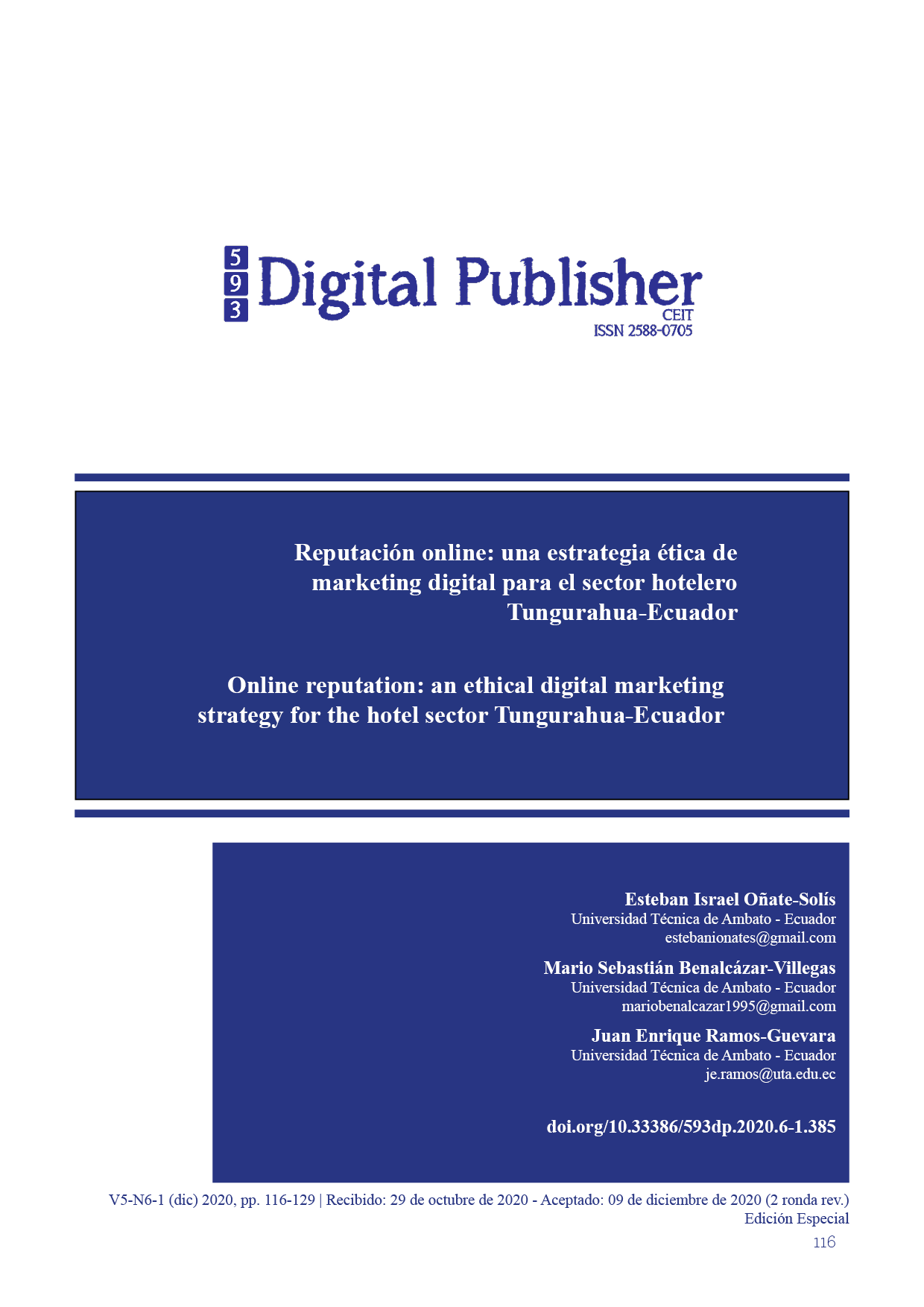Online reputation: an ethical digital marketing strategy for the hotel sector Tungurahua-Ecuador
Main Article Content
Abstract
In the tourism sector there is a constant growth due to the search for tourist services through digital media; being online reputation an instrument to respond to the needs of tourists. Thus, the objective of this study is to propose online reputation as an ethical digital marketing strategy for the Tungurahua-Ecuador hotel sector. Ignorance in the implementation of online reputation strategies in tourism sector companies, as well as in ethical actions in them, was found as a problem. This research is descriptive - exploratory in nature and uses theoretical methods with which to support its development. The information collection technique is a structured survey of companies that provide accommodation activities for short stays in the province of Tungurahua. In addition, a reliability analysis of the questionnaire and a correlation of the study variables were performed. The results include the structure of the strategy with four phases which directly contribute to the improvement of the digital presence, visibility of the hotels and positive opinions about the tourist services offered
Downloads
Article Details

This work is licensed under a Creative Commons Attribution-NonCommercial-ShareAlike 4.0 International License.
1. Derechos de autor
Las obras que se publican en 593 Digital Publisher CEIT están sujetas a los siguientes términos:
1.1. 593 Digital Publisher CEIT, conserva los derechos patrimoniales (copyright) de las obras publicadas, favorece y permite la reutilización de las mismas bajo la licencia Licencia Creative Commons 4.0 de Reconocimiento-NoComercial-CompartirIgual 4.0, por lo cual se pueden copiar, usar, difundir, transmitir y exponer públicamente, siempre que:
1.1.a. Se cite la autoría y fuente original de su publicación (revista, editorial, URL).
1.1.b. No se usen para fines comerciales u onerosos.
1.1.c. Se mencione la existencia y especificaciones de esta licencia de uso.
References
Balmer, J., & Gray, E. (2003). Corporate brands: What are they? What of them? European Journal of Marketing, 37, 972-997.
Benítez, L. (2016). Análisis de la recomendación entre iguales en la reputación online de las organizaciones. El profesional de la información, 652-660.
Collado, A. V. (2012). La reputación online en el marco de la comunicación corporativa. Una visión sobre la investigación de tendencias y perspectivas profesionales. adComunica, 3, 49-63.
Contreras, D., & Martínez, G. (2017). Efecto de las TIC sobre la gestión de las empresas hoteleras afiliadas a Cotelco de Bucaramanga Santander, Colombia. Revista EAN(83). doi:http://dx.doi.org/10.21158/01208160.n83.2017.1827
Cortes, J., Páez, J., & Lozano, O. (2016). La aplicación de las TIC en los sistemas de gestión de las PyME del sector portuario. Revista Redes de Ingeniería, 7(1), 24-40. doi:10.14483/udistrital.jour.redes.2016.1.a05
Fanpage Karma. (2020). Retrieved from https://www.fanpagekarma.com/
García, J., & Benavides, J. (2008). Nuevas tendencias de la comunicación. . Ciclos Complutenses de Comunicación. Madrid, España.
GoogleMaps. (2020). Retrieved from https://www.google.com/maps/
Hamdan, M. (2019). Online customer reviews in social media and brand reputation in the tourism sector. Tesis de maestria. De Valencia, España: Universidad de Valencia. Retrieved from http://hdl.handle.net/10251/124239
He, H., & Balmer, J. (2005). The saliency and significance of generic identity: An explanatory study of UK building societies. The International Journal of Bank Marketing, 23(4/5), 334-348.
INEC. (2020). Directorio de empresas 2018. Retrieved from http://redatam.inec.gob.ec/
Izquierdo, L., Ramón, A., Such, M., & Perles, J. (2019). Tourist environment and online reputation as a generator of added value in the sharing economy: The case of Airbnb in urban and sun- and-beach holiday destinations. Journal of Destination Marketing & Management, 11, 53-66. doi:https://doi.org/10.1016/j.jdmm.2018.11.004
López, A., Ojeda, J., & Ríos, M. (2017). La responsabilidad social empresarial desde la percepción del capital humano. Estudio de un casoThe corporate social responsibility from the perception of human capital. A case study. Revista de Contabilidad, 36-46. doi:https://doi.org/10.1016/j.rcsar.2016.01.001
López, D. (2015). Reputación corporativa y Visibilidad estratégica. Modelo de gestión de la reputación online y su aplicación en las empresas de Barcelona. Catalunya, España: Universidad Internacional de Catalunya.
Ministerio de Turismo. (2018). Rendición de cuentas 2018. Retrieved from https://www.turismo.gob.ec/wp-content/uploads/2019/02/Informe-Rendici%C3%B3n-de-Cuentas-2018-MINTUR.pdf
Ministerio de Turismo. (2019). Indicadores Turísticos Información relevante del Turismo en el Ecuador. Retrieved from https://servicios.turismo.gob.ec/index.php/turismo-cifras/2018-09-24-21-06-03/boletines-mensuales-de-turismo
Moya, D., & Majó, J. (2017). Análisis de comentarios en redes sociales para mejorar la reputación online hotelera. Turismo y Sociedad, XX, 169-190. doi:https://doi.org/10.18601/01207555.n20.09
Nibbler. (2020). Retrieved from https://nibbler.silktide.com/en_US/reports/www.subway.com
Ortíz, H. (2020). Organizational Communication and Digital Reputation in Private Organizations and the Third Ssector of Mexico and Spain. Fonseca, Journal od Communication,(20), 55-70. doi:https://doi.org/10.14201/fjc2020205570
Palos, P., & Ramírez, R. (2018). Ética de la reputación online, marca personal y privacidad en el cloud computing: protección de los usuarios frente al derecho al olvido. Biblios(71), 17-31. doi:10.5195/30 biblios.2018.428
Ramos, Y., Contreras, S., & Pérez, N. (2018). Gestión de la reputación online en el sector hotelero cubano. Revista: Caribeña de Ciencias Sociales.
Saura, J., Palos, P., & Debasa, F. (2017). El problema de la Reputación Online y Motores de Búsqueda: Derecho al Olvido. Cadernos de Dereito Actual 8, 221-229.
Sprout Social. (2020). Sprout Social. Retrieved from https://sproutsocial.com/es/
Thakran, K., & Verma, R. (2013). The emergence of hybrid online distribution channels in travel, tourism and hospitality. Cornell Hospitality Quarterly, 54(3), 240-247.
TripAdvisor. (2020). TripAdvisor. Retrieved from https://www.tripadvisor.com
Vaquero, A. (2012). La reputación online en el marco de la comunicación corporativa. Una visión sobre la investigación de tendencias y perspectivas profesionales. ad Comunica. Revista de Estrategias, Tendencias e Innovación en Comunicación(3), 49-63. doi:http://dx.doi.org/10.6035/2174-0992.2012.3.4
Wichels, S. (2016). Cómo las redes sociales están cambiando la comunicación hotelera. Revista Internacional de Tecnología, Ciencia y Sociedad, 3(2).
Yingtao, X., Ying, Z., Changjun, Y., & Ailian, L. (2018). Optimal control of an online reputation dynamic feedback incentive model. Communications in Nonlinear Science and Numerical Simulation, 63, 1-11. doi:https://doi.org/10.1016/j.cnsns.2018.03.005




